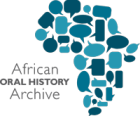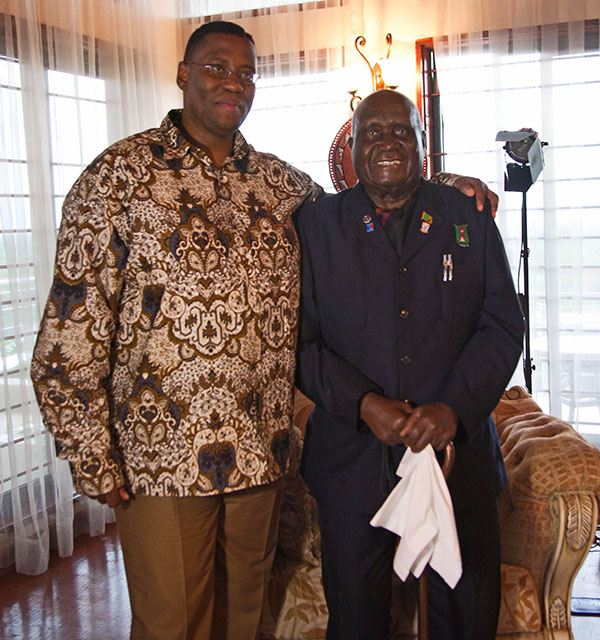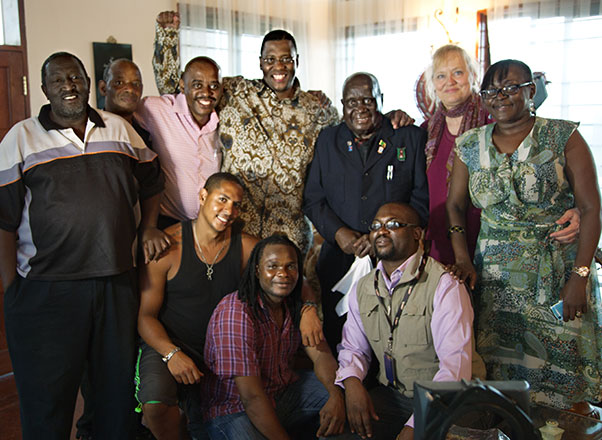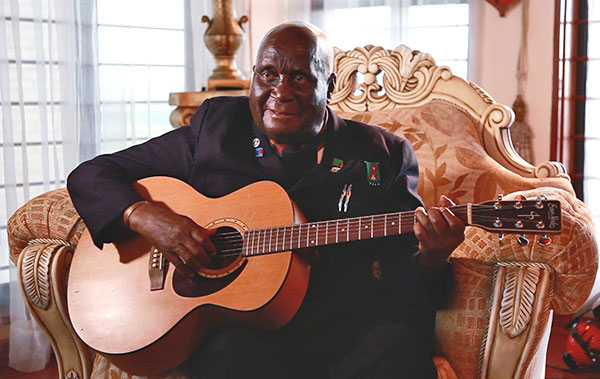The Indelible Media team with Shaka Sisulu, interview the kingpin of the Frontline States, Zambia’s former president Kenneth Kaunda.
Shaka Sisulu:
When Madiba comes to visit for the first time I remember I was here, I was one of the people that received him. A young pioneer, in my, in my little, in my little, in my hat and scarf and all of that holding an ANC flag and you know there was just jubilation and they got in the car, great excitement: What’s the memory of this from your side?
Kenneth Kaunda:
Young man, that was a great moment. That is what my colleagues and I have been waiting for, to get that man out of prison, to come out and start doing what he had come to do here after his imprisonment so it was a great moment, Here is Nelson Mandela arriving, landing on Zambian soil, 27 years in custody we were calling for him to get out of prison. All those South African Boers who were leaders I was meeting is to get Nelson Mandela out of prison I’ve been talking to him. It was happening, I thanked God for the great moment not for me, who am I, for Africa as a whole.
SS: Was there a moment that you had met him before he went to jail?
KK: I first met him (Mandela) together with Oliver Tambo in Ethiopia in 1962. They had come to see me to tell me they were now separating in terms of what they have been doing in that struggle. Oliver Tambo will go out of South Africa and begin spreading a story of that terrible situation of Apartheid and Nelson Mandela would remain inside the country and lead the struggle within that’s what they came to tell me. I was very happy. I remember they were asking they need my contribution, I said ‘I’m afraid in terms of money ask my treasurer Samuel Masopo, he is my treasurer of the party which I’m leading. He might tell you whether it was possible, I don’t know. We are very poor,’ that’s what I told him. But in terms of the struggle itself we are there. We were there.
SS: And obviously was a commitment, which you held fast on to for another 27 years. What is it that kept you personally motivated to stay with your commitment?
KK: God’s teaching to us human beings is of great importance. It commands us love God your Creator with all your heart, all your soul, all your mind and all your strength as that one He has made in His image like you. He commands love your neighbor as you love yourself. Do unto others, as you would like them to do unto you. Young man, these are wonderful commandments and I thank God that he made it possible that these commandments influence me in all my thinking, in all my thinking thank God what do I say though. You see love God your Creator with all your heart, all your soul, allyour mind and all your strength, great commandment if it was for God, God your Creator with all those elements I mentioned in the commandment itself then where can we go wrong.
KK: Then it goes on and say as for the one He made in His image like you, love your neighbor as you love yourself, just imagine love your neighbor as you love yourself, do unto others as you like unto you. Young man this commandments have influenced my thinking and my behavior I thank God. What do I mean? In Zambia there were 73 tribes, 73 tribes there came the English tribe, the Irish tribe, the Welsh tribe, the Scottish tribe thank you, the Indian tribe, the Pakistan tribe, we were more than 80 tribes and if we didn’t accept God’s commandments about how behavior about how to behave towards our neighbors what will be happening in some other tribes in other areas in this world would be happening here which is we came to a point where we think of ourselves as a Zambian nation, Zambezi to the North going round in to the Indian Ocean, Zambezi because our name of the nation was known North Rhodesia, it was called Zambia Zambezia. Zambezia from the top North up going round West, come East Zambezia. You see Zambezia would be Zambia. Zambia, yes Zambia and now when a leader started at the podia and he is shouting at his followers down there, in the crowd “one Zambia” they all reply “one nation” , “one Zambia, one nation”. Only over 80 tribes, all colours on earth. All faces on earth, they were all there. One Zambia, one Nation. And this helped us to come together.
KK: In the name of the Lord God, the Almighty. That’s our song, we were, when we became as a matter we follow God’s commandments, which I have already referred to. This helped us young man guided us to be what we are today.
SS: Your Excellency, when you said you met Mandela and Tambo in 1962. I mean, I have some questions around the time you know. Specifically you know, seem to embrace them… we are made to believe other leaders did not necessarily embrace them they were more favorable towards the PAC and also, how did the go about, deciding who they would met with?
KK: This was 1962 only two years more to go before our independence 1964. So heard about what you are saying about ANC, I have heard about what you are saying about the Boers in South Africa, the English in South Africa and all the groups. I think that influenced them to come and speak to me as they did. And I welcomed that very much indeed. I had heard so much about your commitment to the struggle. I talked about it. And even when they came I was delighted, very delighted indeed. It was in itself a great moment for me to meet those freedom fighters.
SS: I mean the other African leaders at the time, who had heard what you were saying. How soon did you begin to meet with other African leaders? Was that the beginning of what would be could the Frontline States?
KK: The Frontline States we had… we began that with three of us, Julius Kambarage Nyerere of Tanganyika, Tanzania today. And Milton Obote of Uganda, we called it… What did we call it? Mulungushi Club… Mulungushi Club came about because… I had met my colleagues, those two at a place call Mulungushi, where we had been building our own party, political party in Zambia, Lusaka… Not Lusaka, Zambia, sorry not Lusaka, Zambia and we met at this place called Mulungushi… river and a very popular place. So when my colleagues came here to Zambia, those two, Julius Nyerere and Milton Obote I met them at Mulungushi that place where I was meeting my political party. So we said, oh, very good, let’s call our organization now, Mulungushi. That’s how we called it Mulungushi club. And it’s from Mulungushi that developed Frontline States.
SS: How did other countries get involved in The Frontline States? How did it, how did it run, was it just an alliance, was it an ideology, were there requirements of these countries?
KK: It had principals of fighting for Africa’s independence. So as we were fighting for this independence, more countries were becoming independent…then came other African leaders, mainly that team of Nelson Mandela, we saw them as part of our team. So in terms of how we came up; we were looking at African leaders in their respective countries.
SS: How did the citizens trust their leaders, when their leaders were saying we must work together to fight Apartheid even though may be there is bomb blast in Lusaka, there is a bomb blast in Mozambique in Maputo. It kills Mozambicans, it kills Zambians, how do the people of these countries, how do they end up being so steadfast?
KK: Young man, we explained to our people what we were doing. Same thing in Mozambique, Angola, everywhere, our leaders explained to their people what we were fighting, in Angola against Portuguese, in Mozambique against Portuguese, in Zimbabwean against British colonialism, in South Africa, Boers, boerism and so on. Same thing in Namibia, Germans and others. When we told the people we are fighting God’s desire that we should be free. God wants us to be free. He made us free people, free human beings, others have come to colonize us, it’s not God’s will. This our people understood very well, even as we fought against racism and colonialism, there was nothing in our heart about hating races, hating other races at all. No, we fought against racism and we cannot ourselves use our own racism at all. So it was a matter of deep-rooted principle, love God your creator with all your heart, your soul, all your mind, all your strength. I started this… God’s image like you, teaches, God teaches, love your neighbor, whether the neighbor is white, yellow, whatever. If they are green people, love them, so long they carrying God’s spirit, God’s children, they are yours.
SS: How often did the leaders of the Frontline States meet?
KK: Quite often but not all always all together. In Botswana, Seretse Khama, Masire and those who took over from them; in Zimbabwe, it was Nkomo and Mugabe; in Mozambique before Samora Machel came, Mondlane, Mondlane then Masire took over so we were all well identified all of us and we trusted each other very well, very well.
SS: Can we reflect on some of the differences in the strategies that the different Frontline States employed in terms of fighting the Apartheid regime?
KK: Frontline States had a very common stance. And I don’t remember any of them taking a step that could be seen as being away from what the Frontline States stood for, we all stood together until the very end of the Apartheid regime. I remember Julius Nyerere, Agostinho Neto, Samora Machel, Mugabe, Nkomo, Madiba, Sisulu’s… all of them we trusted them and we stood together, we stood together with them.
SS: What was your experience in terms of bringing South African people together from the ANC and the Boer side?
KK: I saw that as an extremely important approach because if the African people in South Africa didn’t come together, they would be allowing certain elements of the Boers to continue to divide them. If you could bring the Boers and the African people together and form a government, which would be a government of national unity, you would be stronger.
SS: How did it come about that you got the ANC talking with business, people led by Tony Bloom amongst others?
KK: I could see that South African businessmen, as I began talking to African leaders could find a base for a common approach to the problem of Apartheid. When we had South African businessmen here, I must say they were sensible but their reacting to that, they did not move as quickly as I thought it would.
SS: A few years later you are at the inauguration of South Africa’s first democratically elected President. Tell us about that.
KK: It was a great moment for me, great moment for me, especially that first elected black President was Nelson Mandela of the ANC, it was a great moment for me and I thank God in South Africa, I thank God wherever I was.
SS: Can you remember a tipping point where you and your comrades in the Frontline States knew that now definitely we are going to, we going to see this freedom?
KK: De Klerk’s release of Madiba and other prisoners from that island was a key moment. When those great men and women of South Africa were released from prison, I knew the time had come, the time had come.
SS: Was there any other moment where the Frontline States leaders came together, counted the cost of South Africa being free and said ‘This is what it has cost us as a country, this is what we gave financially, this is how many people lost their lives.’ Has there ever been a discussion about that?
KK: We were fighting for independence helping South Africa to become independent we did not do that, ‘we will be paid something or we will be thanked in this way that we will receive something for our contribution,’ no, no, no, I am saying No three times like Nelson Mandela’s, ‘Never, never, never.’ Whether it was South Africa or any other place in the world, we were trying to help, we would not charge for that help with a view to receiving something for that.
SS: Do you not feel deep down that South Africa owes some form of responsibility to the Frontline States and if Botswana tomorrow went and said ‘South Africa, pay us back in one way or another’ would you find it unacceptable?
KK: Totally unacceptable, totally unacceptable, totally unacceptable. Madiba flew from South Africa and landed in Lusaka to come and say thank you to the people of Zambia and other African countries I had invited to come here to meet him. He said thank you to them himself. So there is no other way of thanking people than what Madiba did for South Africa and we cannot expect anything more than that.
SS: Now, when the story of Africa is told, I have recently had a baby boy his name is Walter and I, when I tell him the story of the Frontline States how do you like me to tell him the story, what is it, is there a moment, is there a memory that I will pass, hand over to him and say this is what it was about?
KK: Those people who helped to fight for the independence of South Africa were independent countries and they are working to do what God wanted the rest of the world to be, independent. It’s God’s wish, God’s desire, God’s determination, if He did not do that He wouldn’t have sent His own begotten child, His own begotten child to come and die for us, to help us clear our sins, what an amazing God. He wants us to do the same thing.
SS: Thabo Mbeki says the spirit of the Frontline States where all of these countries were working together for the independence of South Africa, that spirit of Ubuntu, should live on in the African Union, but the big question is of course how do we bring it again, how do you bring that spirit?
KK: Ubuntu that is what is required, that’s what Mbeki is taking about, our forefathers all thought of Ubuntu long before white man stepping on their soil. In my language Ubuntu, it’s an amazing teaching; so let’s live by that.
SS: On this note, I want to talk about something that is very African and that is the sprit in which the struggle was waged it wasn’t, just about only sanctions, it wasn’t only about guerillas there were also cultural elements, there was music there was, there was song, you know, do you remember the variety of these cultural elements and in your own…I want to talk about the other side of the struggle. The creative side I mean, even here in Zambia I know the big song was, “Tiende Pamodzi”. Let’s sing it together…
KK: Kenneth Kaunda sings.
SS: Your Excellency I mean things like that; everyone’s spirit gets lifted.
KK: That’s right.
SS: I mean was this calculated was this… was it organic how did this element of struggle come along?
KK: Well it, started again, this is links up with God’s own creation, I take it to that because if you are talking about liberating Africa, where is Zimbabwe, so to get to Zimbabwe you must cross Zambezi river, you don’t stop there, alright supposing… It depends when Zimbabwe comes, it’s South Africa, so you must cross another river, Limpopo and get into South Africa. It’s about the same thing, thinking about God’s people and you see, now we saying, I say even after we have our independence now there is AIDS, we must fight AIDS together, fight AIDS together because we are dying together, suffering together, we must work together, so that we can be independent of this type of disease, so it’s thinking of human, human race in every corner of this world, every situation.
SS: When you look back now your Excellency and in your own life you have seen Zambia becoming independent you have seen all the SADC countries become independent, a lot of them with your own involvement, you have seen Apartheid destroyed, South Africa is free. You see even great strides being made against this disease AIDS. I mean when you look back are you not filled with pride at the role you have been able to play… Do the days when you were fighting for this freedoms not fill you with excitement?
KK: Young man, I think about that question also, this commitment for getting human race relieved of colonialism, released of boerism and so and so on is a belief in importance of human race. A belief in God’s creation, the importance of God’s creation and therefore we must work for that coming to ourselves into us as human beings, what I’m working for now where I am now is to see how South Africa, Zimbabwe, Angola, Mozambique, Namibia, Zambia and of course the rest of Africa fighting poverty and issues of hunger, ignorance, disease, crime, corruption and above all exploitation of man by man in any shape any form this is what I am standing for, for now. I will repeat that. Fighting against, I am fighting up to remove poverty and each off shoot of hunger, ignorance, disease, crime, corruption and above all exploitation of man by man these must be removed beyond human society, that is what I stand for now.
SS: Your Excellency thank you, I have I think two last questions, one I have always, ever since I was a child and I was staying here in Zambia, watching you on TV wondered about the story behind the handkerchief, the white handkerchief. I would not be able to leave without at least asking.
KK: When I was sent to prison last time by the colonial government, they didn’t imprison me in Northern Rhodesia they sent me to Southern Rhodesia and I was there for the last six months and I came out on 7th January 1960 I think, a missionary, son of a missionary John Mafato was a member of the National Council of Zambia, Northern Rhodesia and he was traveling, driving from South Africa to Lusaka, he heard I was being released from prison on that Sunday, he stopped to collect me. I was with him and a thought came to my mind that I should have an emblem which when I stood up to speak to the… God’s people, I will be saying one Zambia they would answer one nation. One Zambia, one nation and when I say that I am actually meaning may God bless you or may God continue to guide you or, and I think that, that way I will be freeing my desire, that God continue to bless His people. God continue to guard His people. So that is the meaning of this handkerchief young man.
SS: it is said that you dancing with Margret Thatcher was a strategy, do you want to comment on that?
KK: When we were going to hold a CommonWealth Summit in Lusaka… Margret Thatcher as Prime Minister of Britain call on her Majesty Queen, please don’t go to Zambia they are very dangerous, very dangerous, it… no it’s not safe at all don’t go. Queen said, Margret Thatcher whether you go or not, I am head of the Common Wealth it’s being held in Lusaka. I am going to Lusaka. If I am going to meet my death there, that’s too bad I am going. So Margret Thatcher thought, came to hear we have, had about that. We knew she would be very uneasy. So we decided that when she came we’d receive her very well. Instead of her trying to destroy the Common Wealth in Zambia and that would… organize a dancing evening. That evening when first music was played, I would stand up my beloved girl Betty Kaunda would stand up. I would go towards Margret Thatcher, she would go towards her husband, and then we would go others would join us, so young men organized that, that evening. Music time came and all Heads of State stand up, so music was played, I got up, she got up, we moved, moved. She got up, that’s how she became my dancing partner and my wife picked her husband up, we joined and others joined us.
SS: When you were dancing did she try and swing, you know in the proxy wars, the West had with the East… did she try to whisper some words and swing in one direction?
KK: No, she tried to be very careful. She danced very well, innocently…
SS: I mean, but in the, in the, speaking about the proxy war, where were you located, where you with the East in terms of, in terms of…
KK: Another very good question young man. I never thought of taking sides, now. We are all God’s children. We are all God’s children. I was happy to travel to visit, countries in the East, today China is one of the biggest investors in Zambia. China is, you know how it came about? There was a civil war in China and China was divided. Collapsing and of course in the end Mao Tse Tung within eighty million people won in that war that civil war. The other man who was leading against him flew, run to Taiwan, Taiwan… Taiwan ten million people there, ten million Chinese at the UN. Western countries we supporting small with ten million people and not China, Julius Kambarage Nyerere and Kenneth Kaunda, no, no, no they led China.
KK: Look at God’s people, numbers, three eighty million. The others are just ten million, how do you say that, we stood strong at the UN, in the end the rest of the organization came to accept us, we won, so from that time China became these… natives of Africa are fantastic, working with them and we became good friends, I visited China several times, I have visited America, West Africa, I mean… Western Europe. Many parts of the world, I visited them all same belief, these are fellow human beings we won, that’s how I won that war. Today China is a great place here in Zambia economically; they are helping us to grow.
Shaka: Mr. President, thank you very much, my own personal question was you know how you say, one Zambia one nation is it conceivable for us to one day be saying One Africa, one nation? Is it desirable?
Kenneth: Young man an extremely important question also, and we must work for that, One Africa, one nation we must work for that it can happen. It’s good to see… an Africa girl (Dr. Nkosazana Dlamini-Zuma) lead African Union in Ethiopia today as our Chairperson. There’s a beginning there, there’s a beginning there. From a Boer country she is leading Africa.
SS: Your Excellency thank you, very, very much, it’s been an absolute pleasure to speak with you.
KK: you are welcome.



